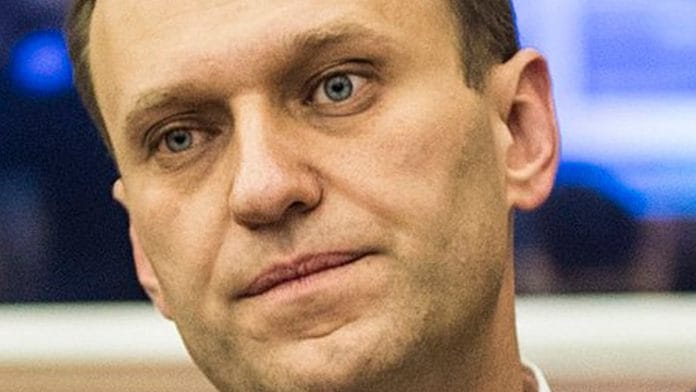Berlin: Chancellor Angela Merkel demanded full transparency from Vladimir Putin’s government after a German medical team determined that Alexei Navalny, the Russian leader’s most prominent critic, was likely poisoned last week.
“In view of Mr. Navalny’s major role in Russia’s political opposition, the country’s authorities are urgently called upon to fully investigate this act as a matter of urgency — and to do so in a completely transparent way,” Merkel said in a joint statement with her foreign minister, Heiko Maas. “Those responsible must be identified and brought to justice.”
The demand marks a sharp escalation in tensions between the West, led in this case by Merkel’s government, and the Kremlin. A U.S. official warned earlier Monday that confirmation he was poisoned would turn the case into a major issue.
Two days after Navalny was transferred to the German capital for medical help, Berlin’s Charite hospital said that the anti-corruption activist is in serious condition but there is no acute threat to his life. However, he may suffer long-term damage to his nervous system, according to the statement.
Navalny has been in a medically-induced coma since Thursday after falling ill on a plane returning to Moscow from Tomsk, and was evacuated from Russia on Saturday.
Blow to ties
His allies blamed Russia’s security services for the poisoning. Kremlin spokesman Dmitry Peskov didn’t immediately respond to a request for comment on the Charite statement.
In Berlin, doctors found evidence of poisoning through a substance related to cholinesterase inhibitors, Charite said. The specific substance wasn’t immediately known and will require further testing to be identified, the clinic said, adding that the patient is being treated with the antidote atropine and his prognosis remains unclear.
The findings are another blow to Russia’s relations with the West. Merkel has confronted Putin directly over the August 2019 murder of a political opponent in Berlin, a killing that German officials blame on the Russian government. Officials also accuse Russian authorities of being behind a 2015 cyberattack on the German Bundestag, the lower house of parliament.
“Putin’s message to the Russian opposition is clear: those who oppose the system live dangerously,” Norbert Roettgen, head of German parliaments’s foreign affairs committee, said in a post on Twitter.
The 2018 poisoning in Salisbury, U.K., of former Russian spy Sergei Skripal and his daughter allegedly by Kremlin agents led to sweeping expulsions of Russian diplomats by the U.K. and its western allies, accelerating the downward spiral in relations.
Ralf Stahlmann, a retired professor of pharmacology and toxicology in Berlin, said the strongest of the substances in the cholinesterase inhibitors group — which can be used to treat dementia and Alzheimer’s — are “military-grade warfare agents.” These poisons — like the Novichok that British investigators blamed in the Salisbury case — can be transmitted through food or drink, or simply by touch.
Navalny, 44, was in the Siberian city of Tomsk meeting local activists and opposition candidates ahead of regional elections set for September. His sudden illness raised suspicions after a string of Kremlin critics fell victim to poisoning in recent years.
Dissident security service officer Alexander Litvinenko died in London after consuming tea laced with polonium in 2006, while ex-spy Skripal survived the 2018 assassination attempt. U.K. officials linked both attacks to the Russian state, though the Kremlin denied any role.
Russian doctors at the Siberian hospital in Omsk that initially treated Navalny said he was not poisoned but suffered from a metabolic disorder. On Monday, they defended their handling of the case, saying their tests showed no traces of cholinesterase inhibitors, according to the state-run Tass news service.
Navalny became Russia’s most prominent opposition figure during 2011-2012 protests against Putin’s return to the Kremlin for a third term following four years as prime minister. He was under close surveillance by Russian security services during his visit to the Siberian city just before he fell ill, Russia’s Moskovsky Komsomolets reported, citing security sources.
“Navalny was poisoned with a substance from the cholinesterase group,” Navalny ally Lyubov Sobol wrote on Twitter Monday. “That’s not something you can make easily. It clearly points to the security services.”
John Sullivan, U.S. Ambassador to Russia, said Monday that the case would likely come up in talks this week in Moscow between Deputy Secretary of State Stephen Biegun and Russian officials.
“We’re very concerned by the reports that Navalny may have been poisoned, and we’re closely watching those developments,” Sullivan told reporters on a conference call before the Charite statement was issued. “If Navalny has been poisoned, that would represent a very significant development for the United States.” – Bloomberg
Also read: Russian opposition leader & Putin critic Alexei Navalny ‘poisoned’, on ventilator






